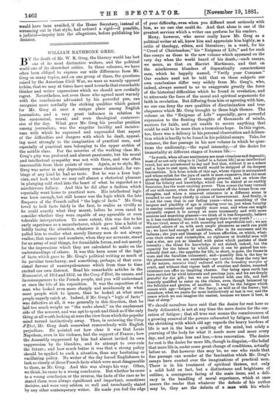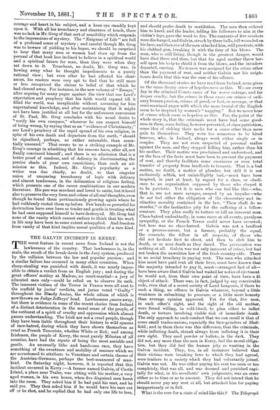WILLIAM R1THBONE GREG. of your difficulty,-even when you differed most
seriously with him, as no one else could do. And that alone is one of the greatest services which a writer can perform for his readers. Many, however, who never really knew Mr. Greg as a political writer at all, know him and appreciate him highly, as a critic of theology, ethics, and literature; in a word, for his " Creed of Christendom," his " Enigmas of Life," and for such fine essays as those in the new volume which appeared on the very day when the world heard of his death,—such essays, we mean, as that on Harriet Martineau, and that on the mischievous blunders of dogmatically conscientious men, which he happily named, " Verify your Compass."
Our readers need not be told that on these subjects our own conclusions differ very widely from Mr. Greg's, who, indeed, always seemed to us to exaggerate greatly the force of the historical difficulties which he found in revelation, and to attenuate the force of the moral and spiritual arguments for faith in revelation. But differing from him or agreeing with him,
no one can deny the rare qualities of discrimination and true eloquence which Mr. Greg brought to these high themes. The volume on the " Enigmas of Life " especially, gave powerful expression to the floating thoughts of thousands of minds, anxious for faith, and yet unable to secure anything that could be said to be more than a tremulous hope. In this region, too, there was a delicacy in his personal observation and delinea- tion which is hardly to be found in his political essays. Take, for instance, the fine passage in his new volume in which he ques- tions the uniformity,—the equal intensity,—of the desire for immortality at different stages of human life :—
" In youth, when all our sentiments are most vivacious and dogmatic, most of us not only cling to it [belief in a future life] as an intellectual creed, but are accustomed to say and feel that, without it as a solace and a hope to rest upon, this world would be stripped of its deepest fascinations. It is from minds of this age, whose vigour is unimpaired and whose relish for the joys of earth is most expansive, that the most glowing delineations of heaven usually proceed, and on whom the thirst for felicity and knowledge, which can be slaked at no earthly fountains, has the most exciting power. Then comes the busy turmoil of our mid-career, when the present curtains off the future from our thoughts, and when a renewed existence in a different scene is recalled to our fancy chiefly in crises of bereavement. And finally, is it not the case that in our fading years—when something of the languor and placidity of age is creeping over us, just when futurity is coming consciously and rapidly more near, and when one might naturally expect it to occupy us more incessantly and with more anxious and searching glances—we think of it lees frequently, believe in it less confidently, desire it leas eagerly than in our youth ? We are tired, some of us, with unending and unprofitable toil ; we are satiated, others of us, with such ample pleasures as earth can yield us ; we have had enough of ambition, alike in its successes and its failures ; the joys and blessings of human affection, on which, what- ever their crises and vicissitudes, no righteous or truthful man will cast a slur, are yet so blended with pains which partake of their intensity ; the thirst for knowledge is not slaked, indeed, but the capacity for the labour by which alone it can be gained has con- sciously died out ; the appetite for life, in short, is gone, the frame is worn and the faculties exhausted ; and—possibly this. is the key to the phenomenon we are examining—age CANNOT, from the very law of its nature, conceive itself endowed with the bounding energies of youth, and without that vigour both of exertion and desire, renewed existence can offer no inspiring charms. Our being upon earth has been enriched by vivid interests and precious joys, and we are deeply grateful for the gift ; but we are wearied with one life, and feel scarcely qualified to enter on the claims, even though balanced by the felicities and glories, of another. It may be the fatigue which comes with age—fatigue of the fancy, as well as of the frame ; but somehow, what we yearn for most instinctively at last is rest, and the peace which we can imagine the easiest, because we know it best, is that of sleep."
We should ourselves have said that the desire for rest here so finely delineated, is not at any time the mere desire for the ces- sation of fatigue ; that all true rest means the consciousness of a growing renewal of the powers exhausted by fatigue, and that the shrinking with which old age regards the heavy burdens of life is not in the least a quailing of the mind, but solely a yearning of the body for what it needs more and more every day, and yet gains less and less,—true renovation. The desire
for rest is the desire for more life, though in disguise,—the belief that more life is, under some great change of conditions, actually before us. But however this may be, no one who reads that fine passage can wonder at the fascination which Mr. Greg's essays have exerted over the imaginations of practical men. There is in his treatment of spiritual themes, not only a solid hold on fact, but a distinctness and brightness of outline, a courageous facing of the main issue, and a deli- cacy in the handling of moral experience, which at once assure the reader that whatever the defects of his author may be, they are the defects of a man with his whole
courage and heart in his subject, and a keen eye steadily kept upon it. With all his trenchancy and clearness of touch, there was no lack in Mr. Greg of that sort of sensibility which responds to the impressions of mystery. The "Enigmas of Life" are full of a profound sense of mystery ; and careful though Mr. Greg was to beware of yielding to his hopes, we should be surprised to hear that many men or women had risen up from the perusal of that book less inclined to believe in a spiritual world and a spiritual future for man, than they were when they sat down to it. Trenchant, no doubt, Mr. Greg was, in hewing away what he thought impediments to a purely rational view ; but even after he had effected his clear- ances, his readers were very apt to find that he still more or less recognised the claims to belief of that which he had cleared away. For instanoe, in the new volume of " Essays," after arguing for many pages against the view that our Lord's expectation and prophecy that his faith would expand till it filled the world, was inexplicable without assuming for him supernatural knowledge, and after maintaining that it might not have been justified at all but for the unforeseen conversion of St. Paul, Mr. Greg concludes with his usual desire to `‘ verify his own compass," wherever he can suspect himself of being wrong, by saying that as an " evidence of Christianity," our Lord's prophecy of the rapid spread of his own religion, in spite of his own death and departure from the earth, " should be signalised, perhaps, as rather untenable, than essen- tially unsound." That seems to us a striking example of Mr. Greg's courage in admitting that his reasons have, after all, not finally convinced himself ; and there is no admission that is a better proof of candour, and of delicacy in discriminating the precise shade of your own convictions, than such an ad- mission as this. Indeed, Mr. Greg's popularity as a writer was due chiefly, no doubt, to that singular union of unsparing trenchancy of logic with delicacy and almost tenderness, in the delineation of religions feeling, which presents one of the rarest combinations in our modern literature. His pen was mordant and loved to smite, but it loved also to preserve the very form and colour of all real thoughts, even though he found them pertinaciously growing again where he had ruthlessly rooted them up before. Few hands so powerful for destruction have ever been so tender and gentle in treating what he had once supposed himself to have destroyed. Mr. Greg had none of the vanity which cannot endure to think that his work in life may have been to some extent misapplied. And freedom from vanity of that kind implies moral qualities of a rare kind.







































 Previous page
Previous page